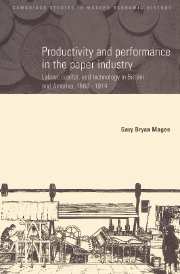 Productivity and Performance in the Paper Industry
Productivity and Performance in the Paper Industry Book contents
- Frontmatter
- Contents
- List of figures
- List of tables
- Acknowledgements
- List of abbreviations
- Introduction
- 1 Background
- 2 Technological change
- 3 Performance
- 4 Rags, esparto, and wood: entrepreneurship and the choice of raw materials
- 5 The Anglo-American labour productivity gap
- 6 Unions and manning practices in Britain and America
- 7 Raw materials, women, and labour-saving machinery: the Anglo-American gap, 1860–1890
- 8 Technological divergence: the Anglo-American gap, 1890–1913
- 9 Free trade and paper
- Conclusion
- Bibliography
- Index
1 - Background
Published online by Cambridge University Press: 16 March 2010
- Frontmatter
- Contents
- List of figures
- List of tables
- Acknowledgements
- List of abbreviations
- Introduction
- 1 Background
- 2 Technological change
- 3 Performance
- 4 Rags, esparto, and wood: entrepreneurship and the choice of raw materials
- 5 The Anglo-American labour productivity gap
- 6 Unions and manning practices in Britain and America
- 7 Raw materials, women, and labour-saving machinery: the Anglo-American gap, 1860–1890
- 8 Technological divergence: the Anglo-American gap, 1890–1913
- 9 Free trade and paper
- Conclusion
- Bibliography
- Index
Summary
Viewed from an international perspective, papermaking in Britain is a relatively recent phenomenon. Although the ability to make paper had filtered through from China via the Middle East to continental Europe by the eleventh century, such knowledge appears not to have been absorbed, or at least implemented, in the British Isles until the end of the fifteenth century when John Tate began operating his mill on the River Lee near Hertford. Within twenty years of its opening, however, this mill, like so many other early paper-mills, had ceased production, and for the next two centuries the industry's existence on these shores remained precarious. Despite its relatively late arrival on the scene, however, the British industry has nonetheless managed to make a disproportionately large and lasting contribution to the trade's economic and technological development. Amongst its achievements can be listed inter alia the first successful mechanisation of the production process, the development of new raw materials such as esparto grass, and the introduction of a wide range of new paper products such as security and bible paper. Yet it is a list of accomplishments that has been largely forgotten by all except a handful of devoted paper historians. Indeed, the number of scholarly works written about the industry's history in Britain can be counted on one hand, with economic history's contribution to this total being virtually limited to A. D. Spicer's The Paper Trade (1907), Donald Coleman's The British Paper Industry, 1495–1860 (1958), and Richard Hills' Papermaking in Britain, 1488–1988 (1988).
- Type
- Chapter
- Information
- Productivity and Performance in the Paper IndustryLabour, Capital and Technology in Britain and America, 1860–1914, pp. 7 - 25Publisher: Cambridge University PressPrint publication year: 1997
